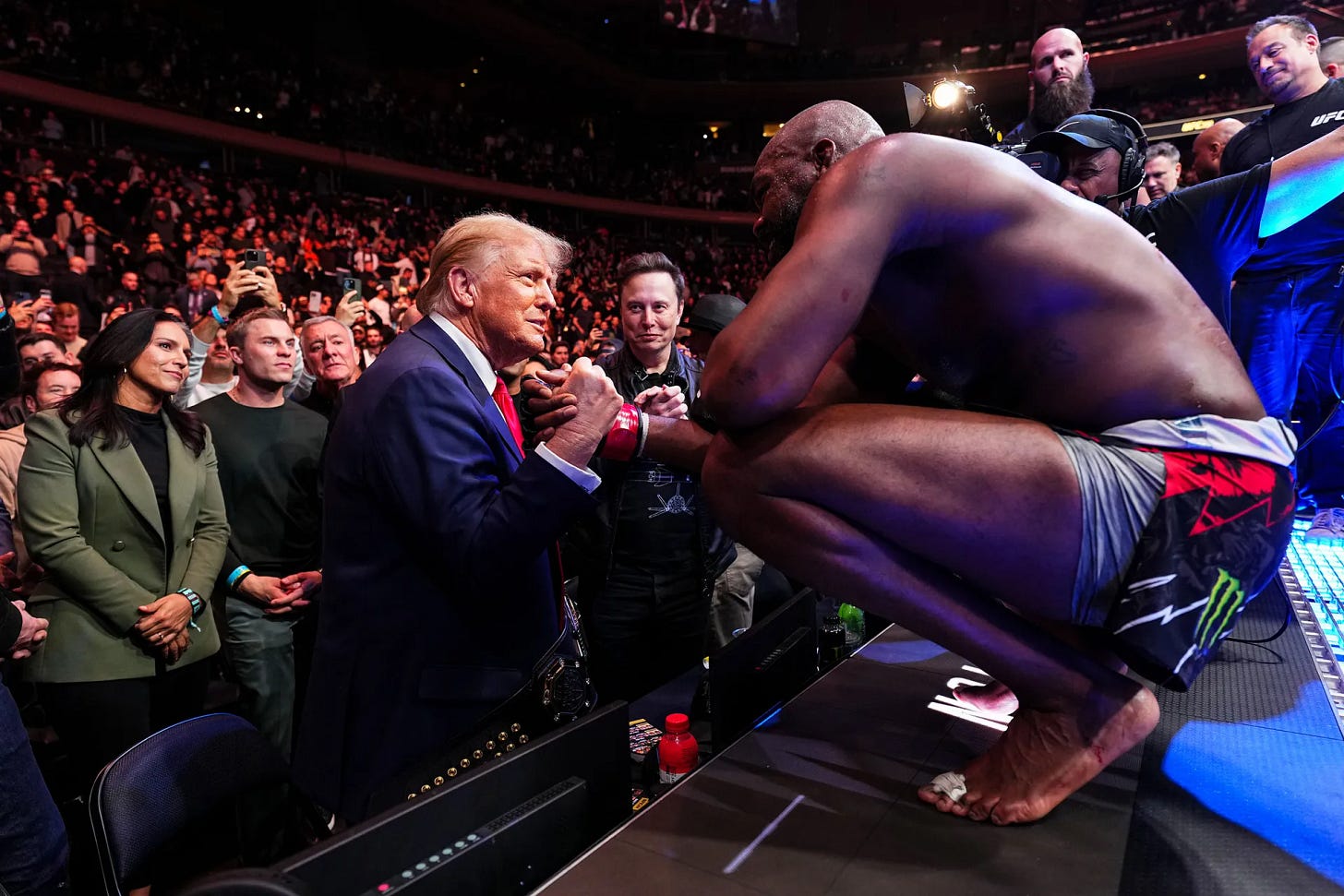Weekend Reading
“Gladiatorial games are believed to find their origins in the burial rituals of the Etruscans, who inhabited the Italian peninsula from about the eighth to third century b.c. Frescoes in tombs dating to the fourth century b.c. in the regions of Lucania and Campania in southern Italy depict funeral games held to honor fallen warriors in which captured enemies were forced to fight. Since the beginning, then, these contests were as much ritual as spectacle … Behind a day in the arena was a well-organized professional system. ‘We know that there were schools where gladiators were coached by experienced trainers and that they were well fed and received medical care,’ (archaeologist Martin Steskal of the Austrian Archaeological Institute) says. Sources indicate that gladiator schools even had specialized doctors on call. The physician Galen, who lived in the Anatolian city of Pergamon in the mid-second century a.d., writes that no gladiators died over a five-year period when he provided them with medical care. ‘Galen likely learned about medicine from, among others, his predecessor, the Ephesian physician Rufus,’ says Steskal. ‘The last thing a school owner wanted was for his gladiator to die. If a gladiator died in his first fight, it would mean all that investment was wasted.’” (Toga Ildun/Archaeology magazine)
“Donald Trump has returned to Madison Square Garden tonight to attend an Ultimate Fighting Championship event at the New York City arena. The president-elect returned to the famed venue just weeks after his controversial campaign rally there. Attendees met him with thundering cheers as he entered alongside UFC CEO Dana White, billionaire ally Elon Musk, cabinet pick Robert F. Kennedy Jr. and Speaker of the House Mike Johnson. Popular podcaster Joe Rogan also attended, greeted Trump with a friendly handshake. Meanwhile, Trump continues to fill key posts in his second administration and tonight named fracking CEO Chris Wright as his choice for energy secretary. Wright, CEO of Denver-based Liberty Energy, is a vocal advocate of oil and gas development and one of the industry’s loudest voices against efforts to fight climate change.” (Oliver O’Connell and Rhian Lubin/The Independent)
“The United States believes Russia fired a never-before-fielded intermediate-range ballistic missile on Thursday in its attack on Ukraine, an escalation that analysts say could have implications for European missile defences. Here’s what we know so far about the missile. The US military said the Russian missile’s design was based on the design of Russia’s longer-range RS-26 Rubezh intercontinental ballistic missile (ICBM). The new missile was experimental and Russia likely possessed only a handful of them, officials said. The Pentagon said the missile was fired with a conventional warhead but that Moscow could modify it if it wanted. ‘It could be refitted to certainly carry different types of conventional or nuclear warheads,’ Pentagon spokesperson Sabrina Singh said. Jeffrey Lewis, a non-proliferation expert at the Middlebury Institute of International Studies in California, said the Russian president, Vladimir Putin, had earlier hinted that Russia would complete the development of an intermediate-range ballistic missile (IRBM) system after Washington and Berlin agreed to deploy long-range US missiles in Germany from 2026. ‘The RS-26 was always [a] prime candidate,’ Lewis said. Singh said the new variant of the missile was considered ‘experimental’ by the Pentagon. ‘It’s the first time that we’ve seen it employed on the battlefield ... So that’s why we consider it experimental.’ US and UK sources indicated that they believed the missile fired on Dnipro was an experimental nuclear-capable, intermediate-range ballistic missile (IRBM), which has a theoretical range of below 3,420 miles (5,500km). That is enough to reach Europe from where it was fired in south-western Russia, but not the US.” (The Guardian)
“Ever since Dana White, the founder of the Ultimate Fighting Championship, appeared onstage at Donald Trump’s election night victory party and paid homage to a parade of podcasters—Theo Von, the Nelk Boys, ‘the mighty and powerful Joe Rogan’—media watchers have been talking about the role that alternative media played in boosting Trump, what it reveals about our increasingly fragmented information ecosystem, and what it all means for journalism. While it is still possible for major news media companies to break through in such a climate, ‘it’s not a predictable or even easily understandable phenomenon, as social media platforms change alongside their viewers,’ CJR’s Feven Merid wrote last week. Announcing the result on election night, a video made by one news influencer on TikTok racked up roughly as many views as MSNBC averaged for its Election Day live broadcast, Merid noted. Such figures, one expert told her, are ‘the new New York Times.’ This week, we saw some further data points on this and related phenomena. On Monday, a much-discussed study from the Pew Research Center reported that roughly one in five Americans—a figure that rises to nearly two in five among young people—say they regularly get information from news influencers, a term that Pew defines as individuals who regularly post about ‘current events and civic issues’ and have at least a hundred thousand followers on a major social platform; Pew found that these influencers skew male and right-wing (though not by much, in the latter case) and tend not to have any background in traditional newsrooms. Also on Monday, Puck’s Peter Hamby wrote about a poll that his outlet conducted in partnership with Echelon Insights, noting that public reaction to Trump’s, erm, controversial cabinet picks has generally been more positive than the frenzied news cycle around them might suggest, and observing that ‘legacy media is losing its place in the attention economy.’ The same day, Abby Phillip, an anchor on CNN, spoke at an event at Harvard. ‘I feel like I have to talk about my own demise here, but that’s what it is,’ she said. ‘People are not watching TV anymore.’ On Wednesday, we learned that several other cable networks, including MSNBC and CNBC, would be spun off by their owner, Comcast—a move that the Times interpreted as a bid to unshackle the company’s movie and theme park assets from ‘the waning fortunes of traditional television.’” (Jon Allsop/CJR)
“The startling revelation this week of Joe Scarborough and Mika Brzezinski's journey to Mar-a-Lago prompted a question that many members of the media are quietly asking: Just how worried should we be? And speaking more practically, what preparations and precautions should news outlets take ahead of President-elect Donald Trump's return to power? … I've been compiling this list based on conversations with anchors, editors, press freedom advocates, and other figures. >> In the second Trump term, legal threats and frivolous lawsuits could pile up, costing newsrooms money and time. >> The Trump administration could reinstate the Justice Department's past practice of pursuing reporters' records in leak investigations. >> Online and real-world harassment could increase if political extremists feel emboldened to target journalists. >> Media companies and individual journalists could face politically-motivated IRS audits. >> Government agencies like the FCC could use existing laws, like those governing TV station licenses, to pressure newsrooms. >> The administration could ‘slow or even kill future transactions’ by media companies deemed opponents, as CNN's Matt Egan recently wrote.” (Brian Stelter/Reliable Sources)
“For an otherwise pliant group of Senate Republicans, former Rep. Matt Gaetz's nomination as attorney general was a bridge too far. Zoom in: There are scores of MAGA loyalists who could have sailed through Senate confirmation, plenty of whom were on the shortlist compiled by Trump's transition team.
Instead, Trump chose a congressman not only despised by his GOP colleagues, but embroiled in a widely publicized House Ethics investigation into alleged sexual misconduct and illicit drug use.
The explanation is head-spinning but simple: Trump has achieved historic political success by following his instincts — and his instincts tend to favor maximum chaos.
The big picture: Trump won't be inaugurated for another two months, but MAGA mayhem is already dominating the news cycle in the same ways it did throughout his first term.” (Zachary Basu/Axios)
“For determined hackers, sitting in a car outside a target's building and using radio equipment to breach its Wi-Fi network has long been an effective but risky technique. These risks became all too clear when spies working for Russia's GRU military intelligence agency were caught red-handed on a city street in the Netherlands in 2018 using an antenna hidden in their car's trunk to try to hack into the Wi-Fi of the Organization for the Prohibition of Chemical Weapons. Since that incident, however, that same unit of Russian military hackers appears to have developed a new and far safer Wi-Fi hacking technique: Instead of venturing into radio range of their target, they found another vulnerable network in a building across the street, remotely hacked into a laptop in that neighboring building, and used that computer's antenna to break into the Wi-Fi network of their intended victim—a radio-hacking trick that never even required leaving Russian soil. At the Cyberwarcon security conference in Arlington, Virginia, today, cybersecurity researcher Steven Adair will reveal how his firm, Volexity, discovered that unprecedented Wi-Fi hacking technique—what the firm is calling a ‘nearest neighbor attack’—while investigating a network breach targeting a customer in Washington, DC, in 2022. Volexity, which declined to name its DC customer, has since tied the breach to the Russian hacker group known as Fancy Bear, APT28, or Unit 26165. Part of Russia's GRU military intelligence agency, the group has been involved in notorious cases ranging from the breach of the Democratic National Committee in 2016 to the botched Wi-Fi hacking operation in which four of its members were arrested in the Netherlands in 2018. In this newly revealed case from early 2022, Volexity ultimately discovered not only that the Russian hackers had jumped to the target network via Wi-Fi from a different compromised network across the street, but also that this prior breach had also potentially been carried out over Wi-Fi from yet another network in the same building—a kind of ‘daisy-chaining’ of network breaches via Wi-Fi, as Adair describes it. ‘This is the first case we’ve worked where you have an attacker that’s extremely far away and essentially broke into other organizations in the US in physical proximity to the intended target, then pivoted over Wi-Fi to get into the target network across the street,’ says Adair. ‘That’s a really interesting attack vector that we haven’t seen before.’” (Andy Greenberg/WIRED)
“In an excerpt on meeting Russian President Vladimir Putin at the 2007 Munich Security Conference, Merkel says Putin presented himself as ‘someone who was always on his guard, not to be trifled with, and always ready to dish it out.’ She confirms a famous story that Putin brought his large Labrador to a private meeting with her. It is well-known that an earlier incident left Merkel with a phobia of dogs, but Putin has denied doing it on purpose to intimidate her. She also says he regularly arrived late for the purpose of making people wait … She goes on to describe him as singularly preoccupied with the United States, as if longing for the days of the Cold War. Merkel also sheds some light on her infamous first meeting with US President Donald Trump in 2017. An incident went viral on social media in which Merkel appeared to ask Trump to shake hands for a photo, and he ignored her. She writes that he appeared to not understand her request, and then pelted her with questions about growing up under a dictatorship. He was interested in ‘my East German background and my relationship with Putin. He was clearly very fascinated by the Russian president,’ Merkel says, adding: ‘In the years that followed, I had the impression that has was captivated by politicians with autocratic and dictatorial tendencies.’ She asserts that Trump spent the rest of their first meeting criticizing her. ‘He claimed that I had ruined Germany by taking in so many refugees in 2015 and 2016, accused us of spending too little on defense and criticized us for unfair trade practices,’ according to Merkel. Merkel suggests that Trump saw everything through the eyes of a real estate mogul, and did not appear to understand the intertwined global economy, complaining about German cars on New York City streets. ‘We were talking on two different levels, Trump on the emotional level, me on the factual level. When he did pay attention to my arguments, it was mostly just to turn them into new accusations,’ she says. ‘Resolving the issues raised did not appear to be his goal.’” (Elizabeth Schumacher/DW)

“In his generation of Kennedys, RFK Jr. isn’t the only tragic figure but the only one who thought he deserved to be president. Some ran for and won office, serving honorably like Kathleen Kennedy Townsend and Joseph Kennedy II, but none had the nerve to launch a campaign for president, complete with a Super Bowl ad putting their face on an old Jack Kennedy ad from 1960. But RFK Jr. will do anything for attention and sees his dark history as an opportunity, joking that if all the skeletons in his closet voted for him, he’d win in a landslide. A heroin addict as a teenager, he kicked the habit just before his 30th birthday. He had a bad first marriage and moved on to a second and a brutal divorce. His wife hung herself from the rafters of their barn. There were other drugs, including a suspected addiction to testosterone (his ripped septuagenarian abs don’t come from touch football) and ones to control a condition that makes it impossible for him to clear his throat. Addiction is no sin, but it does not give him the authority to teach the country how to overcome its addictions. There’s no Hubris Anonymous to overcome his vision of himself.” (Margaret Carlson/Washington monthly)
“Is it newsworthy that Donald Trump’s share of the 2024 presidential vote has fallen below 50 percent? You wouldn’t think it’s a big deal based on the relatively few headlines triggered by the milestone, which passed quietly last weekend as California and other states continued their glacially slow vote counts. And maybe that’s as it should be. After all, Trump’s 49.9 percent (for now) is still more than Kamala Harris’ 48.3 percent. When the counting is done, the margin will probably have shrunk even further. No matter: It still earns him 312 electoral votes from a population that also gave his Republican Party control of the House and Senate. He won. All the same, the numbers might seem a wee bit jarring to anyone who has been listening to Washington’s triumphal Republicans and self-flagellating Democrats — all of whom seem to have internalized a version of the story that involves a romping, stomping Trump triumph. It’s hard to blame them: Even as the counting progressed, Trump’s victory was described as ‘resounding’ by news organizations ranging from the Associated Press to the The Washington Post to the The New York Times to POLITICO. Others offered ‘commanding win,’ ‘runaway win’ and ‘dominant victory.’ Say what? To coin a phrase, we’ve defined dominance down. After years as a 50-50 country, it seems, even a small win gets talked about like a shellacking. Wriggling into office with a puny plurality and less than half the vote in an essentially two-way race used to be considered pretty weak sauce. A squeaker. Why do we now treat a JV-caliber success like some sort of Olympian feat?” (Michael Shaffer/Politico)
“On the campaign trail, the most convincing argument Musk offered was not on Joe Rogan’s show or onstage at Trump’s rallies. It was on the launch pad in Boca Chica, Texas, where Musk’s aerospace company dazzled the world by catching a returning rocket with a pair of robotic arms. If the man who did this supports Trump with such fervor, couldn’t Trump accomplish even some of what he promised? A lot of voters seem to think so, especially the young men Musk targeted for Trump with his bravado. ‘The biggest factor here is that men need to vote,’ Musk told Rogan on the eve of the election. The next day, when 60% of white men turned out for Trump, Musk tweeted: ‘The cavalry has arrived.’ But his appeal reached well beyond the manosphere. It also moved a swath of voters who were put off by Trump’s character but excited by his policies. TV pundits said these people needed a ‘permission structure’; Musk provided just that to suburban women like Betsy Stecz. As she stood in line for his October rally in Lancaster, Pa., Stecz described a sense of relief: ‘You have people finally feeling like, OK, I can hold my head up and say: I’m not ashamed to vote for Donald Trump.’ The reason, in her view, was Musk. Given his role in the victory, Musk may have expected some reward. But his perch in Trump’s transition has reportedly unnerved some members of their entourage. For much of November, Musk camped out at Mar-a-Lago, weighing in on Cabinet picks and advising Trump on policy priorities. He went golfing with the President-elect, sat ringside with him at an Ultimate Fighting Championship event and took pictures with the Trump family; one grandkid raved on social media that Musk had attained ‘uncle status.’” (Simon Schuster/Time)



